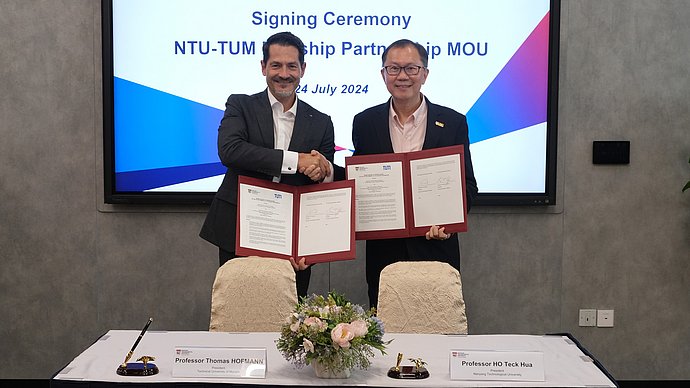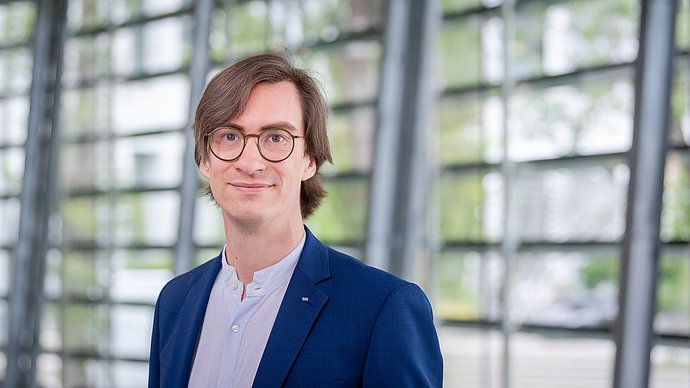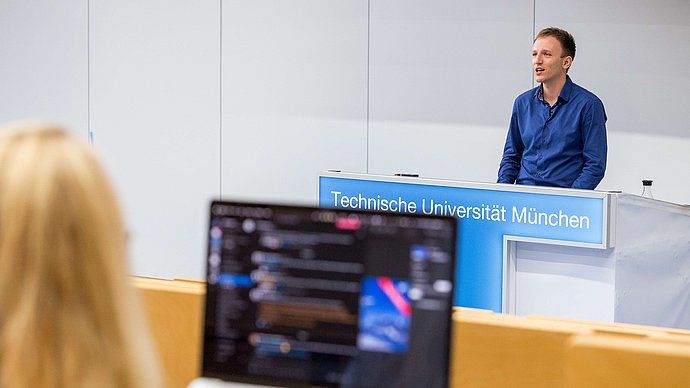Press releases

Study examines data from over 1,500 people affected by rare diseases
34 new genetic diseases identified
Supported by artificial intelligence (AI), a research consortium has elucidated the genetic backgrounds of numerous rare diseases. The genetic causes of these diseases were successfully identified in nearly 500 patients. Remarkably, 34 previously unknown diseases were discovered.

Global network is growing
TUM and NTU Singapore sign flagship partnership
The Technical University of Munich (TUM) and Nanyang Technological University Singapore (NTU) have set up a flagship partnership. The agreement strengthens TUM's cooperation with NTU and its global network in Southeast Asia.

Share index rose despite crisis
Higher compensation for DAX board members
The executive board members of DAX companies earned around six percent more in 2023 than in the previous year. These are the findings of the annual study by the Technical University of Munich (TUM) and DSW, an advocacy group for private investors. Despite many crises, the DAX had developed positively in the long term, which also had an impact on managers' income.

Diagnostic capabilities of large language models tested
Are AI-chatbots suitable for hospitals?
Large language models may pass medical exams with flying colors but using them for diagnoses would currently be grossly negligent. Medical chatbots make hasty diagnoses, do not adhere to guidelines, and would put patients' lives at risk. This is the conclusion reached by a team from TUM. For the first time, they investigated systematically, whether this form of artificial intelligence (AI) would be suitable for everyday clinical practice. Despite the current shortcomings, the researchers see potential in the technology. They have published a method that can be used to test the reliability of future medical chatbots.

NewIn: Helge Stein
"Radically accelerate the way we do research"
In this episode of NewIn, we meet Prof. Helge Stein. He develops new materials for catalysis and rechargeable batteries, and aims to connect and accelerate research in the lab using machine learning, artificial intelligence and robotics.

Major advance for long-distance electric road transport
World’s first megawatt charger for electric trucks
With partners from industry and research institutions, the Technical University of Munich (TUM) is to make battery-powered trucks viable for long-distance cargo transport. Megawatt charging represents an important step towards this goal. The first prototypes were presented to the public on Friday at an event on the Plattling Technology Campus with the Bavarian Minister of Economic Affairs Hubert Aiwanger in attendance. With the new charging post and truck, it will now be possible for the first time to charge the battery sufficiently for 4.5 hours of operation within the regulatory rest period – with no additional waiting time.

TUM Klinikum rechts der Isar and German Heart Centre Munich will be combined
Bavarian Parliament authorizes TUM University Hospital
As of August 1, TUM Klinikum rechts der Isar and German Heart Centre Munich will be combined to form the new TUM University Hospital. The Bavarian Parliament enacted the corresponding change in the Bavarian Law on University Clinics. The parliament also launched the M1 – Munich Medicine Alliance Foundation. The alliance consolidates the strengths of the Munich universities, their clinics and Helmholtz Munich.

Software tool integrates the needs of animals and plants in building plans
Computer-aided design of green building envelopes
Researchers from the Technical University of Munich hope to transform building envelopes into habitats for animals, plants and microorganisms. Their aim is to develop a software plug-in capable of incorporating the relevant knowledge into the design process.

Global discourse series “One Topic, One Loop“: Christine Nellemann
Sustainability is about more than CO2 reduction
The third author in our global “One Topic One Loop” series is Christine Nellemann, Dean for Sustainability, Diversity and International Cooperation at the Technical University of Denmark (DTU). In her contribution, she discusses how a university's academic and infrastructural activities can be jointly geared towards greater sustainability.

AI to assist students
Chatbot Iris offers individual support
How can a chatbot support students in lectures and with assigned exercises? Researchers at the Technical University of Munich (TUM) have developed the chatbot Iris, which offers computer science students personalized assistance with programming assignments. A study has now confirmed the chatbot’s success: Iris improves the understanding of programming concepts and represents a valuable complement to human tutors.